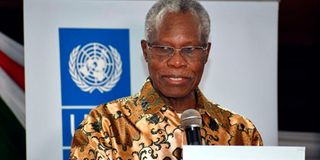We need to proactively teach the youth about conflict resolution

NCIC Chairman Samuel Kobia speaks during the Let Peace Win campaign launch on June 18, 2022. The government, through NCIC, dissuades people from using terminologies seen as inflammatory.
Conflict often creates a tense environment, where people may feel they are walking on eggshells. Whenever Kenya enters the general election campaign period, there is usually tension that may boil over into conflict between supporters of different candidates. Sometimes the reasons for this runs deep, probably arising from years of hidden feelings that can lead to an outburst of emotions and feelings.
To curtail the catalysts for these emotions, the government, through the National Cohesion and Integration Commission (NCIC), dissuades people from using terminologies seen as inflammatory. NCIC has blacklisted 23 words in political campaigns, terming them hate speech.
The move, it is hoped, will help to alleviate political conflicts. But there are groups of youth going around the country spreading proactive peace messaging.
Even then, conflict is normal among humans. Learning how to respond to it is critical since that enables individuals to understand why it was there in the first place. Often caused by a hindrance to a particular goal, it can be interpersonal or intra-personal.
First, they need to know why the conflict is there begin with. Is it something that can be resolved just by having a discussion? If it includes another person, can one see it from their perspective?
Secondly, and closely related to the burden of mental health, there is a phenomenon called intra-personal conflict—meaning a conflict existing in one’s mind.
Often, it is a good idea to involve a family member or close friend to help to sift through the burden in your mind. You may find solutions to how you feel and get a way to address the challenges.
Another idea may be taking a self-care day. Learning to de-stress your mind is imperative when it comes to intra-personal conflict; sometimes it may be stress and external factors that create a conflict in your mind.
Dealing with intra-personal conflict can cause an individual to lose their sense of direction and deal with distractions and procrastination. This is normal. Taking a step back can help to deal with the clutter in your mind to become a productive person. Constantly ask yourself why conflict may have occurred in a particular situation.
Many people can relate that conflict resolution is not taught but naturally learnt throughout the course of life. But if conflict resolution was taught from an influential point of life, it could possibly support individuals who struggle with inter-personal and intra-personal conflict. That can ensure they have peaceful disagreements—be it religious, political or personal conflicts.
Peaceful disagreements enable an individual to understand that everybody has different values and interests. They may not always be in their favour; however, it teaches them to always welcome differences.
Sagal Abdi & Karungari Nduba, Nairobi





